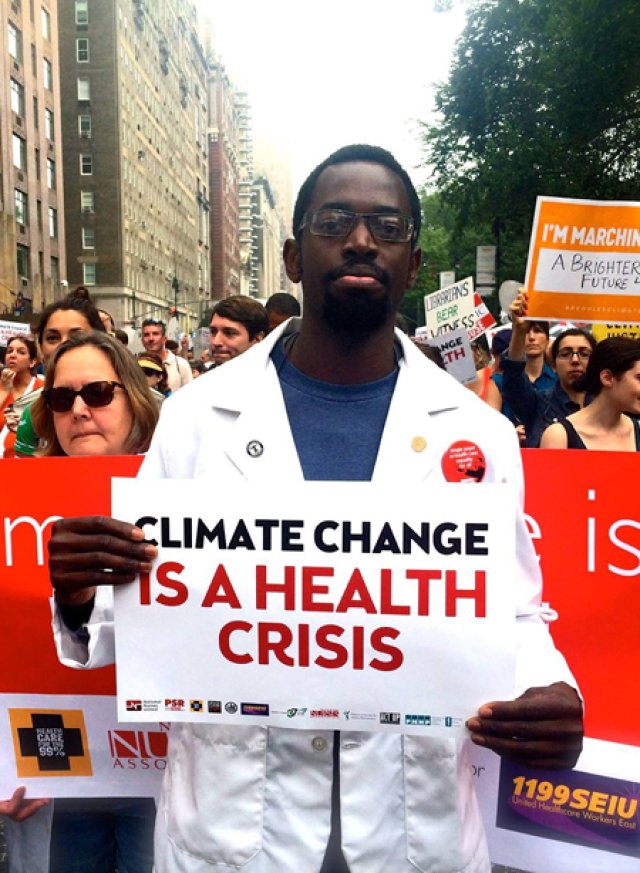
Health services in Australia are resource intensive and a leading producer of waste and greenhouse gases, which contribute to global climate change.
The Victorian public healthcare system contributes 1% of Victoria’s total emissions and is estimated to be 2.8% of Victoria’s total ecological footprint.
The health implications of climate change and the environmental degradation it produces have become a central concern for many health care workers, particularly nurses and midwives who have taken on the challenge of making a significant contribution to environmental sustainability in healthcare.
The Victorian Branch of the Australian Nurses and Midwives Federation (ANMF) has introduced a suite of measures to educate its members on how climate change can affect health and ways to lower the carbon footprint of healthcare networks.
A change in the union’s ethos occurred when a delegates' resolution, passed at the 2012 Delegates Conference, urged the union to become more involved in policy debate on climate change and environmental issues.
Since then the ANMF has forged ahead with an environmental policy framework and the roll out of education to support behavioural change in their membership and to equip them to improve environmental sustainability in healthcare settings.
An offshoot of the original member’s motion in 2012 has been the launching of the annual Health and Environmental Sustainability Conference. Starting with 150 nurses and midwives in 2013, it has grown substantially to an attendance of more than 700 in 2017. The growth in attendance has shown that nurses and midwives care about their environment and are committed to delivering sustainable healthcare to their patients.
This year’s conference heard from a range of speakers from horticulturalist Jamie Durie to Nobel Laureate and former Australian of the Year, Professor Peter Doherty.
Speakers highlighted the need for urgent action on climate change. Jamie Durie talked about last year being the hottest on record. “If temperatures rise another 0.8°C the Great Barrier Reef will be lost,” he said.
Doherty spoke about climate change as being the most serious health threat to face humanity. Doherty used strong language to describe his anger and frustrations with the federal government’s inaction on climate change.
He said: “Don’t vote for any government that wants to open a new coalmine. … We don’t want another coalmine on the Barrier Reef.”
Doherty also spoke about healthcare workers having a “duty of care” to reduce their carbon footprint. Health problems from vector-borne diseases, such as dengue fever, Ross River virus and Zika virus, have all come as a result of climate change and we have a responsibility to fight it.
Heatwaves also create incredible stress for the population and contributed to 203 deaths in Victoria in 2014. These heatwaves will continue to affect vulnerable people such as children and the elderly. They will place pressure on emergency services, which are already underfunded and under-resourced.
In her opening statement at the conference, assistant secretary of the Victorian branch of the ANMF (Vic Branch) Pip Carew described how health and the environment were inextricably linked through extreme weather events such as floods and fires and thunderstorm asthma.
The conference showcased Victorian hospitals that are implementing changes to reduce water, waste, electricity and start recycling programs. Carew said “nurses have taken up the mantle and have run with it”.
In 2015, the union introduced a new Environmental Health Officer position — a role dedicated to supporting members to implement changes in this arena. The new position also helps connect members to “green champion” groups within health networks and establish new “green groups”, drive new policy, network with nurses and midwives and liaise with government and grassroots groups.
Education is a big focus of the new appointment and so far this year the union has held the first of two seminars to teach nurses environmentally sustainable practices, which will also contribute to their mandatory continuous professional development.
As part of the last Enterprise Bargaining Agreement (EBA), the Service Delivery Partnership Plan (the former productivity initiatives), an agreement was made between the union, the Victorian government and the Victorian Hospitals’ Industrial Association to reduce the environmental impact of health services.
Environmental sustainability practices are now embedded in the EBA and will deliver both economic and health benefits not only to nurses and midwives but also to the Victorian community.
ANMF (Vic Branch) has also partnered and networked more broadly with other organisations such as Climate and Health Alliance, Health Care Without Harm and Global Green and Healthy Hospitals.
They realise that there is no future in a dead planet.
[Jackie Kriz and Zeta Henderson are delegates for the ANMF (Vic Branch) and are members of the Green Champion Group in their workplace. Zeta recently presented at the 2017 Health and Environmental Sustainability Conference on PVC recycling. For more information on the ANMF (Vic Branch) activities supporting environmental sustainability, click here.]
Like the article? Subscribe to Green Left now! You can also like us on Facebook and follow us on Twitter.